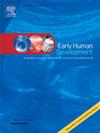Increased parent speech and parent stress is associated with early vocalizations in preterm infants
IF 2
3区 医学
Q2 OBSTETRICS & GYNECOLOGY
引用次数: 0
Abstract
Background
Children born preterm are at increased risk of abnormal neurodevelopment, including delays in acquisition of social, behavioral, and language skills. Development of early language skills, including child vocalizations (CVs) and conversational turns (CTs), is impacted by early exposure to parents' speech, which may be affected by parents' mental health.
Objectives
To study the association between parental speech, parental measures of stress, anxiety, depression, and preterm infant language.
Methods
Single-center, prospective longitudinal cohort pilot study in preterm infants born at <33 weeks' gestational age (GA). Language ENvironment Analysis (LENA) devices were used to measure language exposure. Parental mental health was measured using the Parental Stressor Scale: Neonatal Intensive Care Unit (PSS-NICU) and the Patient Reported Outcomes Measurement Information System (PROMIS) Anxiety and Depression instruments at three time points. Associations between adult word count (AWC), CVs, and CTs were evaluated using linear regression analysis. Partial correlations and repeated measures analyses were used to study associations between infant language and parental mental health.
Results
20 infants were enrolled (median GA 30 weeks, 60 % male). CVs and CTs were recorded as early as 30 weeks' postmenstrual age (PMA). There was a positive correlation between weekly AWC and weekly CVs and CTs (R2 0.174, p < 0.0001; R2 0.338, p < 0.0001, respectively). Parental PSS-NICU and PROMIS Anxiety scores decreased over time, while PROMIS Depression scores did not. There was a significant positive correlation between parents' PSS-NICU scores and time spent at bedside (partial correlation 0.49, p = 0.001; 0.46, p = 0.005 for mothers and fathers, respectively). Parent PSS-NICU scores were inversely correlated with CVs and CTs, though this was not statistically significant.
Conclusion
Preterm infants appear to produce vocalizations as early as 30 weeks PMA, even while on non-invasive respiratory support. Higher AWC while parents are at the bedside is strongly correlated with preterm infants' early language skills. Unexpectedly, higher PSS-NICU scores, indicative of increased parent stress, are associated with increased time parents spent with the infant. Further study is required to determine whether increased parent-infant verbal engagement leads to decreased stress in NICU parents.
父母言语和压力的增加与早产儿早期发声有关
早产儿童神经发育异常的风险增加,包括社交、行为和语言技能的习得延迟。早期语言技能的发展,包括儿童发声(cv)和会话转换(CTs),受到早期接触父母语言的影响,这可能受到父母心理健康的影响。目的研究父母言语、父母压力、焦虑、抑郁测量与早产儿语言的关系。方法采用单中心、前瞻性纵向队列研究,对33周胎龄早产儿进行研究。语言环境分析(LENA)装置用于测量语言暴露。采用父母压力源量表:新生儿重症监护病房(PSS-NICU)和患者报告结果测量信息系统(PROMIS)焦虑和抑郁工具在三个时间点测量父母心理健康状况。使用线性回归分析评估成人字数、cv和ct之间的关系。采用偏相关分析和重复测量分析研究了婴儿语言与父母心理健康之间的关系。结果20名婴儿入组(平均出生年龄30周,60%为男性)。早在月经后30周(PMA)记录cv和ct。每周AWC与每周cv和ct呈正相关(R2 0.174, p <;0.0001;R2 0.338, p <;分别为0.0001)。父母PSS-NICU和PROMIS焦虑评分随时间下降,而PROMIS抑郁评分则没有。家长PSS-NICU评分与患儿床边陪伴时间呈正相关(偏相关0.49,p = 0.001;分别为0.46,p = 0.005)。父母PSS-NICU评分与cv和ct呈负相关,但无统计学意义。结论:即使在无创呼吸支持下,早产儿早在PMA 30周时就开始发声。当父母在床边时,较高的AWC与早产儿的早期语言技能密切相关。出乎意料的是,更高的PSS-NICU评分表明父母压力增加,与父母与婴儿相处的时间增加有关。需要进一步的研究来确定亲子语言交流的增加是否会减少新生儿重症监护病房父母的压力。
本文章由计算机程序翻译,如有差异,请以英文原文为准。
求助全文
约1分钟内获得全文
求助全文
来源期刊

Early human development
医学-妇产科学
CiteScore
4.40
自引率
4.00%
发文量
100
审稿时长
46 days
期刊介绍:
Established as an authoritative, highly cited voice on early human development, Early Human Development provides a unique opportunity for researchers and clinicians to bridge the communication gap between disciplines. Creating a forum for the productive exchange of ideas concerning early human growth and development, the journal publishes original research and clinical papers with particular emphasis on the continuum between fetal life and the perinatal period; aspects of postnatal growth influenced by early events; and the safeguarding of the quality of human survival.
The first comprehensive and interdisciplinary journal in this area of growing importance, Early Human Development offers pertinent contributions to the following subject areas:
Fetology; perinatology; pediatrics; growth and development; obstetrics; reproduction and fertility; epidemiology; behavioural sciences; nutrition and metabolism; teratology; neurology; brain biology; developmental psychology and screening.
 求助内容:
求助内容: 应助结果提醒方式:
应助结果提醒方式:


